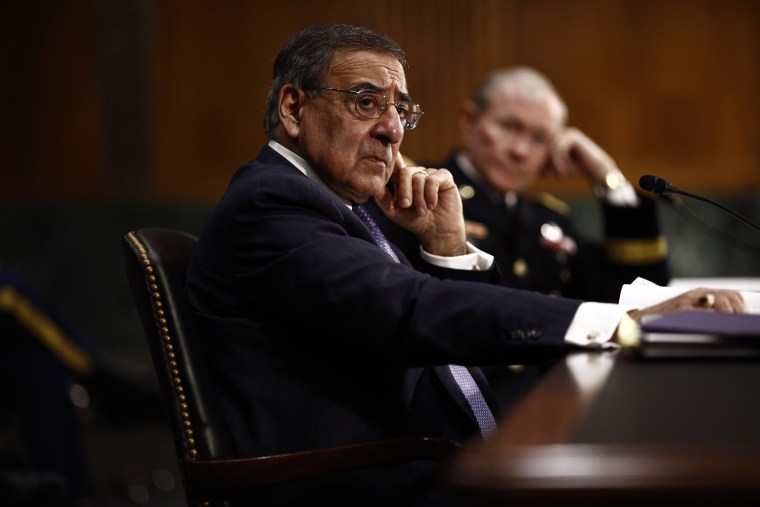Why do President Obama's secretaries of defense keep trashing him?
This week, former Defense Secretary and CIA Director Leon Panetta joins his predecessor, Robert Gates, in writing memoirs about their time in government that includes unvarnished criticism of their former boss.
In Penatta's book, “Worthy Fights: A Memoir of Leadership in War and Peace,” and media interviews timed to its release, the Democrat says President Obama has "lost his way” and was wrong to withdraw all troops from Iraq. He also criticizes the president’s “failure” not to earlier arm so-called moderate Syrian rebels. Rather than assert initiative, Panetta writes, the president "avoids the battle, complains, and misses opportunities.”
Gates went even further in his book published in January, writing that the president made military decisions for political reasons.
There's a rich history of administration officials of both parties who have left government to write censorious books about a chief executive still in office. Besides these exposés' stated goals of record straightening, truth-telling, and lesson-dispensing, the books often have more personal aims as well. After all, these former officials wouldn’t burn a bridge to the most powerful person in the world unless they had a compelling reason to do so, or at least feared no consequences.
Some commentators have wondered why Panetta and Gates (and to a lesser degree former Secretary of State Hillary Clinton) have shown such “stunning disloyalty” to the president, as The Washington Post’s Dana Milbank wrote. Vice President Biden last week criticized the books as “inappropriate.”
But Gates and Panetta never took a loyalty oath to Obama. Neither man owes Barack Obama for their careers, nor does he have anything to offer them in his final two years in office. There is little downside to them for speaking out, and plenty of upside. Call it a side affect of the much-vaunted "Team of Rivals" approach Obama took in arranging his cabinet.
Gates was a Republican near the end of his career who was appointed defense secretary by George W. Bush and had served previously under Bush’s father. Obama, after winning election in 2007, had to practically beg Gates to stay on the job. Panetta, meanwhile, had already served as White House Chief of Staff and Budget Director under Bill Clinton. When Obama took office in 2009, Panetta was happily retired at his beloved walnut farm in California.
Panetta owes a lot more to Bill Clinton than to Obama. who made the former House Budget Committee. And if anyone can offer Panetta anything of interest now, it’s not the lame duck Obama, but Clinton’s wife.
Hillary Clinton and Panetta (and Gates before Panetta) were often allies in internal administration debates, countering the influence of the more dovish Biden. Now on the outside, Panetta seems to be doing as much as he can to use his accrued credibility to boost Clinton.
In an interview with msnbc’s Andrea Mitchell Tuesday, Panetta was asked who was more qualified to be president -- Clinton or Biden, who is also considering a bid. “They both could do the job as president. But, I think Hillary Clinton, because she is out there, is somebody that i think could be a very strong president,” he replied.
On arming the so-called moderate Syrian rebels, the most contentious issue that divided Clinton and Obama during her tenure in the administration, Panetta staked out a position further from the White House than Clinton’s. While Clinton has said she "can’t sit here today and say that if we had done what I recommended...we’d be in a demonstrably different place,” Panetta is willing to go farther.
“We would be in a better position to have in the rebel operation, a group that we would have worked with and helped arm,” he told Mitchell. That position vindicates Clinton’s support for arming rebels, while allowing her to stay closer to Obama,.
On Benghazi, the biggest scandal on Clinton’s watch at State, Panetta offered another subtle, but notable assist to Clinton. She and former UN Ambassador Susan Rice have come under fire for using talking points that falsely stated the violence was the outgrowth of a protest, not a coordinated terror attack.
But in his book, Panetta blames the CIA and its then-director, David Petraeus, for delivering faulty intelligence. “I remember saying [to Petraeus] look, based on the weapons I see and the nature of the attack, I think this was a terrorist attack. He said look, the information we are getting from intelligence sources is that it really was a demonstration. I said you know, David, I don't see it that way,” he told Mitchell.
The compound in Libya was essentially an intelligence operation with diplomatic cover. And in the aftermath of the attack, the CIA and the State Department fought a back-channel bureaucratic war over responsibility, evident in emails released by the White House that show the evolution of those infamous talking points.
By tacitly siding with Clinton’s State Department, and against the CIA, Panetta bolsters Clinton on one of her biggest weakness with the credibility that only a former CIA Director can possibly bring to the table.
The situation is more complicated for Clinton, who wrote her own memoir and used the accompanying media tour to criticize the president's foreign policy. Her tenure as secretary of state has made her immeasurably stronger politically, and she’ll need the president’s supporters if she runs again.
But Clinton did, of course, lose the presidential nomination to Obama in a contest largely centered on the two candidates' positions on the 2003 invasion of Iraq. And she’ll also need to distance herself from the deeply unpopular White House if she runs again.
Panetta, it seems, is ready to help.
